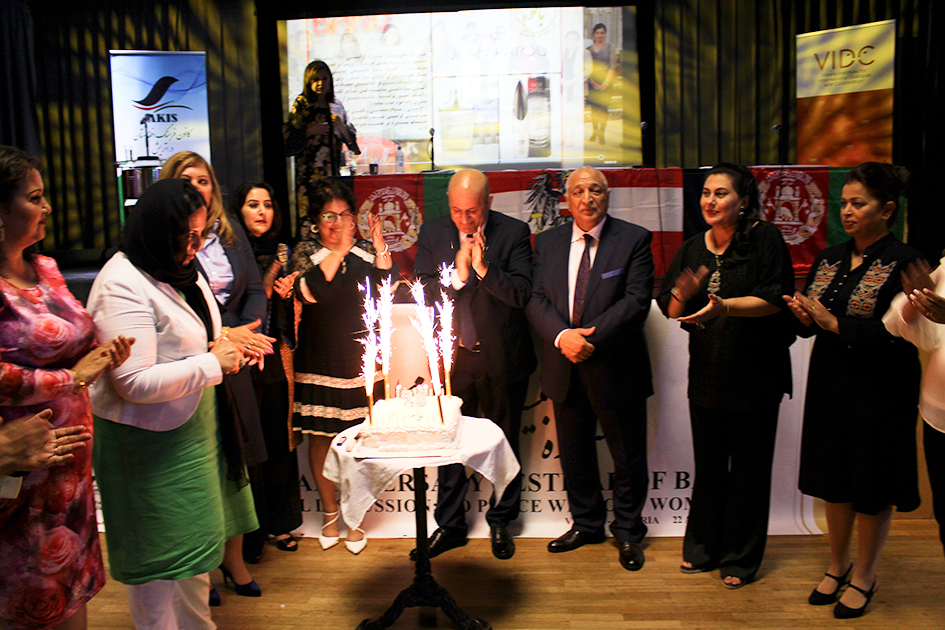
VIENNA, September 08, 2020 – On the 22nd of August, a dozen Afghan women and men stood around a birthday cake to celebrate the 20th anniversary of an Afghan women’s magazine in Europe called ‘Banu’ (woman). The celebration took place in a large school auditorium in Vienna where pictures of the Editor-in-Chief, Nahid Olumi and influential Afghan women in the diaspora flashed on a PowerPoint slide while ‘Happy Birthday’ played in the background.
This was the first relatively large gathering of Afghan women in the diaspora since the Covid-19 outbreak. The event had three main agendas: to bring Afghan women from various European countries together to network, to discuss the meaningful participation of women, their fears and expectations in the ‘soon to begin’ intra-Afghan negotiations, and to represent their culture through food and music.
Publishing in two of Afghanistan’s official languages, Pashto and Dari, Banu was founded in the year 2000 in Austria by the head of the Afghanistan Cultural Association, Ghousuddin Mir. Its main objective is to support the diaspora of Afghan women with integrating into their new countries, keeping them connected with their home country and other Afghan women throughout Europe and beyond. More than 60 editors and journalists from the Afghan diasporic communities in Europe contribute to this magazine, which is available online and also in print.
“When I first established Banu, I did not believe that one day I would celebrate its 20th anniversary. I could not believe that the Afghan ambassador to Austria who is also a woman would attend the celebration,” said Ghousuddin Mir, the founder and owner of Banu magazine during his opening speech at the event. He said he was happy and proud that his team at Banu reached this huge milestone.
The ambassador of Afghanistan to Austria, Khojesta Fana Ebrahimkhel commended Banu for giving a voice to Afghan women. “Banu is more than a magazine. It’s a symbol of change,” she said.
Despite the fact that for many decades millions of Afghans have formed part of the diaspora and engaged in their new home country, they have not been able to participate in major decision-making processes in Afghanistan such as the presidential elections. The Editor-in-Chief and founder of Banu magazine therefore started a campaign to advocate for the inclusion of Afghan diaspora in Afghanistan’s presidential elections. The Editor-in-Chief of Banu presented an official open letter to be delivered to the Afghan president during her speech to the Afghan ambassador to Austria.
The letter addresses Ashraf Ghani, the Afghan President and requests that he provides the opportunity for millions of Afghans who are part of the near diaspora, mainly in Iran and Pakistan and the wider diaspora in Europe, the Americas and Australia to be able to vote in the next presidential elections.
According to Afghanistan’s Ministry of Refugees and Repatriation (MoRR), around five million Afghans live in Iran and Pakistan, their neighboring countries, since the start of the exodus of Afghans in the late 1970s. More than half a million Afghans live across Europe with Germany hosting 257,110 Afghans – the highest number in Europe by the end of 2018. During the same period 45,724 Afghans lived in Austria, 47,779 lived in the Netherlands, and 51,979 lived in Sweden. The data from each country indicates that more than half of these Afghans migrated to Europe during the 2015 and 2016 refugee ‘crisis’.
In 2019, Banu started the initiative in the Netherlands where campaigners became fully aware of the political and technical challenges attached to this process. The objective of the campaign is to attain the right for the Afghan diaspora to vote in Afghanistan’s 2024 presidential elections.
“So far we think we don’t belong to Afghanistan because we are not able to vote. To feel we belong to Afghanistan, we should be able to vote in the presidential elections,” said Nahid Olumi, the Editor-in-Chief of Banu, while presenting the letter to the Afghan ambassador.
The intra-Afghan peace negotiations and the inclusion of women was another central debate of Banu’s 20th anniversary. During her address, Khojesta Fana Ebrahimkhel emphasized the meaningful participation of women in the reconciliation process. She believed that peace was not possible without the contribution of half of the society. “Real peace will not come unless we pave the ground for it,” she said.
The ‘no-entry zones’
The US administration and the Taliban struck a deal on the 29th of February to end the United States’ longest military engagement in Afghanistan. The 18-month long negotiations that led to the historic peace agreement between the US and the Taliban did not include women at any stage of the process. Afghan women face uncertainty about their future and fear that they may lose the gains they have achieved after the invasion of Afghanistan by the US in 2001.
Fawzia Koofi, a prominent women’s rights advocate and a member of the Afghan team tasked to negotiate with the Taliban said in an interview with Al Arabiya English that women have not been part of the long Afghan war, but want to be part of the peace process. She believes that peace without women will not last long. “We will have a long and hard time, but I am prepared because I think as women we have to really enter the no-entry zones,” Koofi said in a reference to intra-Afghan peace talks.
Since the signing of the peace agreement, the impasse of swapping prisoners blocked the start of peace talks between the government and the Taliban which is the core element of the agreement. In a tweet on the 28th of August, Afghanistan’s former intelligence chief, Rahmatullah Nabil warned of “possible threats to Afghanistan, the region and the world due to the growing influence of Pakistan’s military in Afghanistan’s peace process.” He also used the term ‘proxy peace’ to refer to the Taliban who is under the direct patronage of Pakistan in Afghanistan.
The Afghan women want and will support any peace initiative, but not at any cost. Ebrahimkhel reiterated that Afghan women do not want to go back to the Taliban era of 1996-2001 when they had no rights. “Peace is about compromise, but our compromise will have a limit and women’s rights will not be compromised,” Ebrahimkhel emphasized.
The Afghan ambassador Ebrahimkehel was convinced that her country would overcome the challenges of the difficult peace negotiations ahead. “As long as the Amu River flows in our country, Hindu Kush mountains embrace us, there is still hope. Hope for a safe, peaceful and humane life,” said optimistic outgoing ambassador.
_______________________
By Ali Ahmad/Vienna
Photo credit: AKIS
Link: http://www.diplomaticaspects.eu/human-rights/3285-afghan-women-s-magazine-banu-is-a-symbol-of-change



